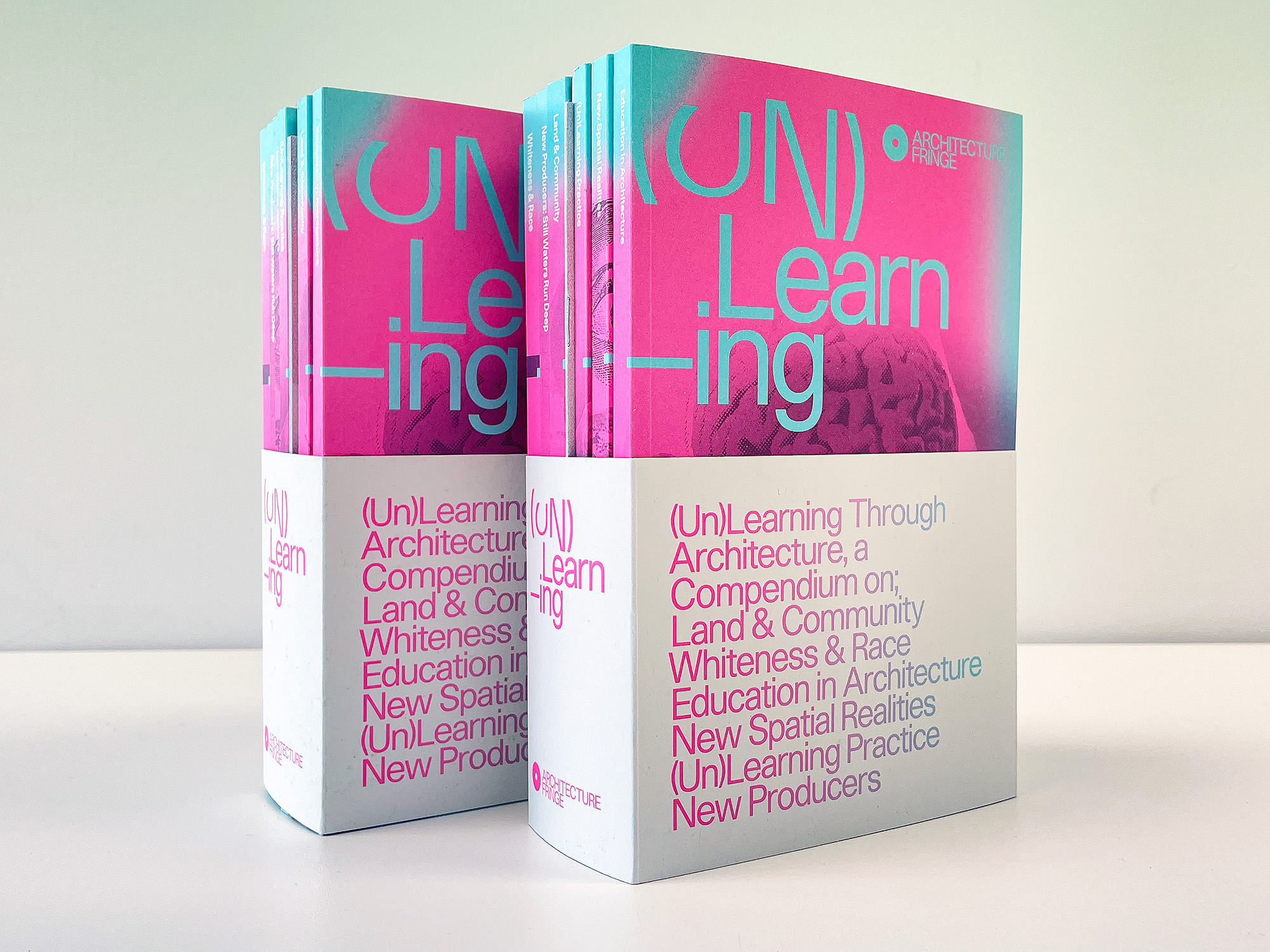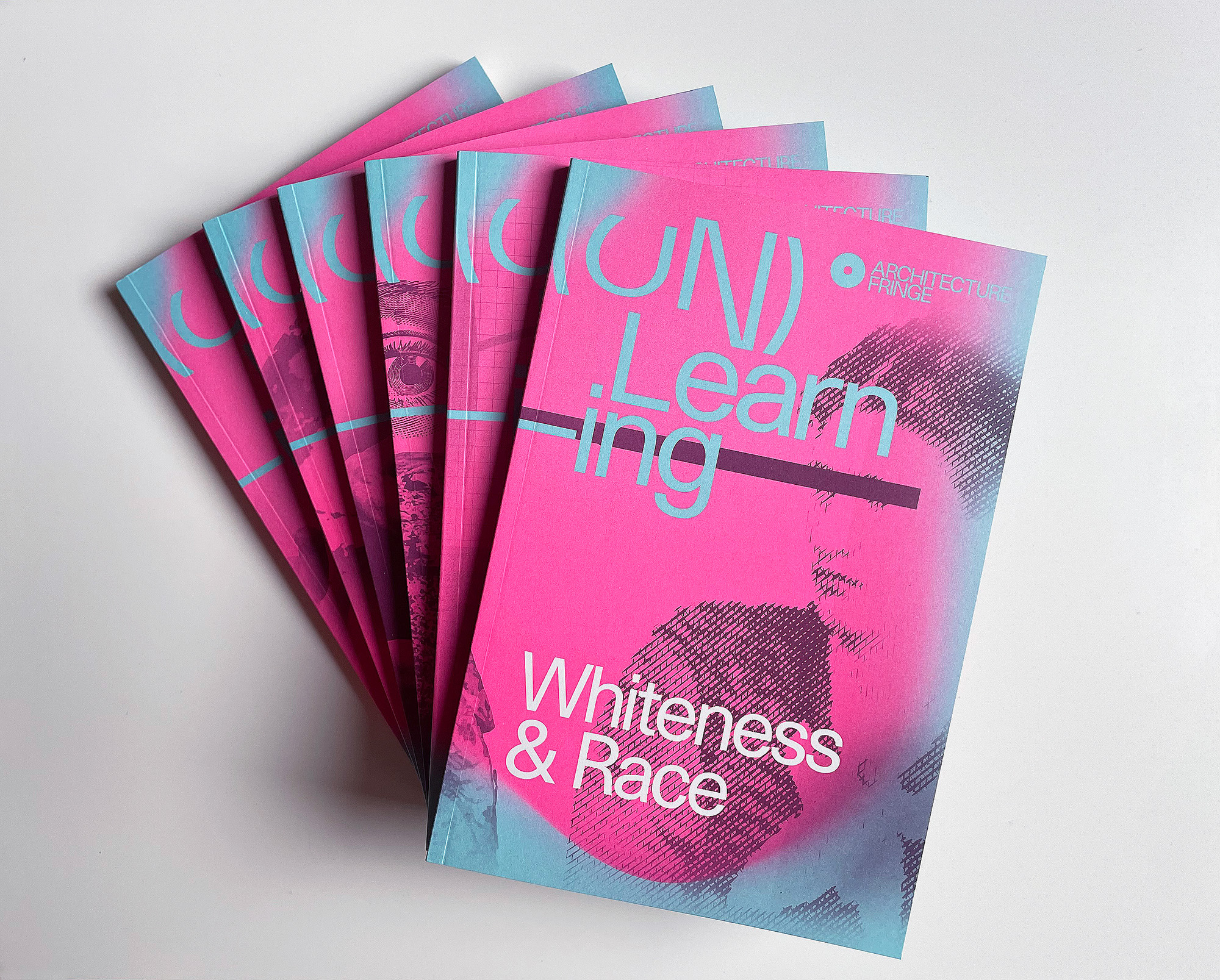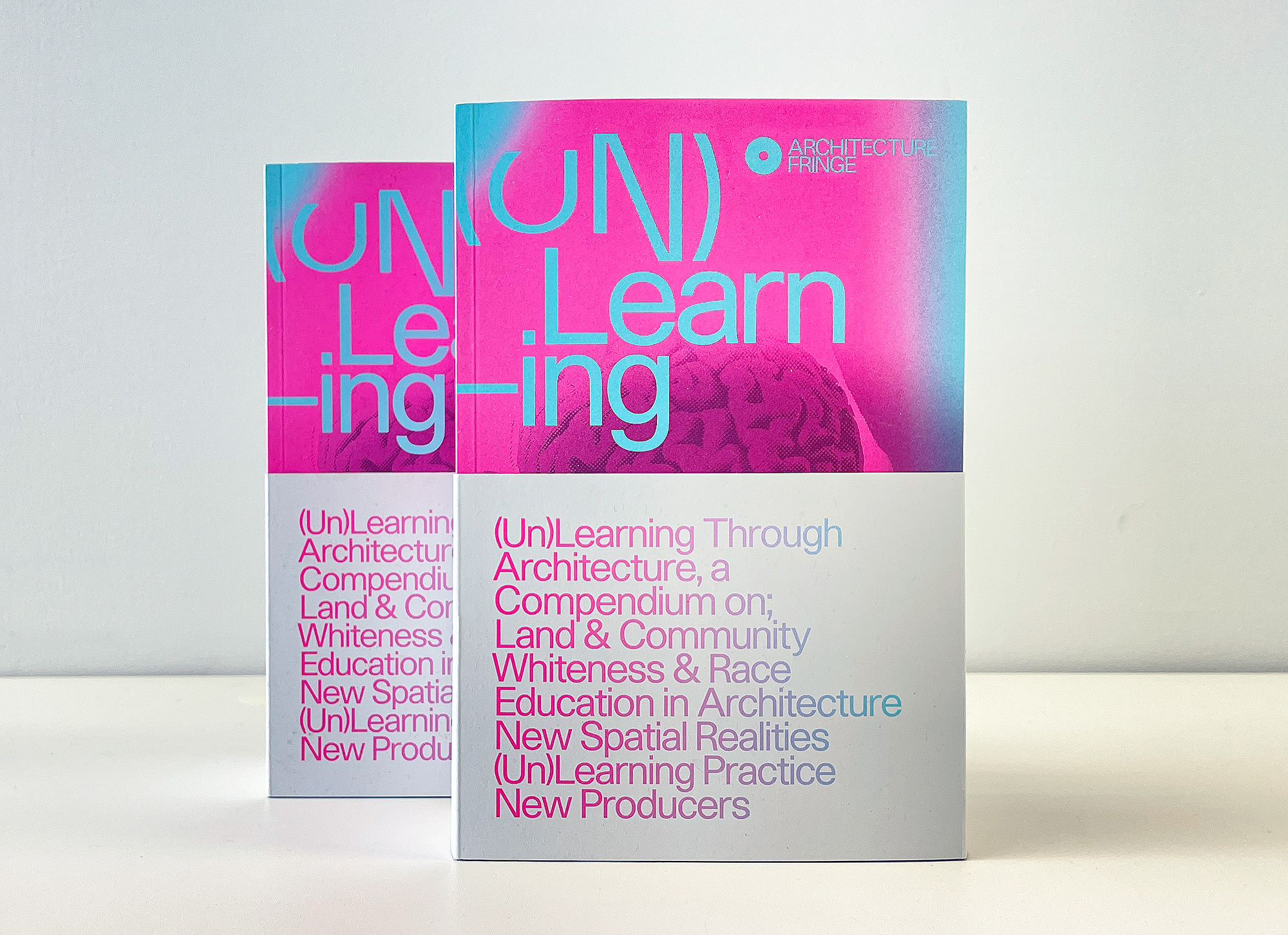UnLearning with Scotland’s Architecture Fringe
With a richly designed & packed compendium of six books & three zines, Scotland’s non-profit Architecture Fringe reflect upon their 2021 biennial festival, considering how to UnLearn practices, conventions & processes in preparation of evolving the world of architecture & place.
Architecture Fringe is a Scottish grassroots organisation
which publicly explores how architecture intersects with the political,
cultural, and social world. Created by a group of architects, engineers,
artists, musicians, curators, and designers as a non-profit Community Interest
Company, it organises training for emerging voices in the presentation and
discussion of architectural issues, is a campaigning organisation (most
recently around climate action), and curates an architectural biennial festival
running across Scotland.
The last of these was in 2021, taking the provocation theme as (Un)Learning, building on its climate action work, exploring interconnecting themes with walks, talks, exhibitions, podcasts, and community activities. Architecture Fringe have now published a deliciously designed publication – or rather, a set of six books and three zines – pulling together the work, ideas, and outcomes of the two and a half weeks of cultural events.
Their compendium (Un)Learning Through Architecture presents in shocking pink six key frames to reflect upon the 2021 festival:
![]()
Collaborators from around the world have contributed to the series, touching on the hyper-local as well as themes which relate to global discussions and actions. The New Producers book documents the processes of learning carried out by the inaugural cohort of emerging thinkers tasked with creating new cultural work, and includes testimony of the team of six spending a day at the Polwarth Pontoon on Edinburgh’s Union Canal. They discussed the towpath and value of the canal with those passing by, inviting the public to contribute through writing, drawing, and responding to questions about how and why the canal is recreationally used.
The publication features several of the insightful and delightfully innocent drawings by the public alongside captured quotes: “You kind of just experience the landscape as you walk along this path. It’s a kind of hypnotic experience.” and “Once more attention gets brought to these canals and the value that they hold, their value is seen as commercial.”
Value – and the conversation of a plurality of values, rather than a focus upon financial value – is also present in the New Spatial Realities book. It documents a design and research project through three design teams who each imagined how spaces could be created as more equitable though architectural design, spatial use, and embedded culture.
One of these teams, Migrant’s Bureau – a social design and urbanism practice working for and with disenfranchised and migrant communities across the UK – explored the subject of food landscapes, seeking alternative methods to a reliance upon existing vast infrastructures and industries to offer collective meals and sustenance. Through films, which are QR linked to in the publication, the group look at how the making and sharing of food offers a platform for collective action, sharing religious and cultural experiences, and supporting new community focused businesses centred on sustainable futures.
NOOMA, another design group in the same publication, focused on co-creation of accessible and people-led urban spaces. As part of Architecture Fringe, NOOMA created a zine Lost In Play which is included in the compendium, a punk-aesthetic lo-fi designed pamphlet presenting ideas of how offenders can be rehabilitated and work with communities to generate a common good, looking at waste soil and brown-field abandonment in Tottenham, London, and moments of play as a tool of urban imagining. The zine evolved from an event of the same name which explored how play – for adults as well as children – can be an asset for collective reimagining and co-design.
![]()
The Whiteness & Race publication in the compendium includes a number of commissioned essays which explore various intersections of race and place, richly illustrated and laid out. One of these, by Natasha Thembiso Ruwona, considers Scottish black historu through a lens of hauntology and ecology with a text exploring place, trace, trade, memory, and memorials. “The visibility of invisibility, the feeling that comes with feeling a history.” they write, continuing “We are remembered as easily as they forget and are forgotten after momentary regret.”
Thoughts now turn to the 2023 edition of the Architecture Fringe festival, which has taken the theme (R)Evolution, focusing attention on the systems and structures needed to repair a planet and people impacted by pandemic, economy, authoritarianism, and climate. As with previous festivals, over a variety of public events and productions, the growing network will ask how things can be built, managed, and owned differently. To begin to answer the questions of how to rebuild and reimagine, first the act of unlearning the worst of our ways must be complete, and how better to do this than through Architecture Fringe’s richly presented writings on how to just this?
![]()
The last of these was in 2021, taking the provocation theme as (Un)Learning, building on its climate action work, exploring interconnecting themes with walks, talks, exhibitions, podcasts, and community activities. Architecture Fringe have now published a deliciously designed publication – or rather, a set of six books and three zines – pulling together the work, ideas, and outcomes of the two and a half weeks of cultural events.
Their compendium (Un)Learning Through Architecture presents in shocking pink six key frames to reflect upon the 2021 festival:
New Spatial Realities
Land & Community
Whiteness & Race
New Producers: Still Waters Run Deep
Education in Architecture
(Un)Learning Practice
Land & Community
Whiteness & Race
New Producers: Still Waters Run Deep
Education in Architecture
(Un)Learning Practice

Collaborators from around the world have contributed to the series, touching on the hyper-local as well as themes which relate to global discussions and actions. The New Producers book documents the processes of learning carried out by the inaugural cohort of emerging thinkers tasked with creating new cultural work, and includes testimony of the team of six spending a day at the Polwarth Pontoon on Edinburgh’s Union Canal. They discussed the towpath and value of the canal with those passing by, inviting the public to contribute through writing, drawing, and responding to questions about how and why the canal is recreationally used.
The publication features several of the insightful and delightfully innocent drawings by the public alongside captured quotes: “You kind of just experience the landscape as you walk along this path. It’s a kind of hypnotic experience.” and “Once more attention gets brought to these canals and the value that they hold, their value is seen as commercial.”
Value – and the conversation of a plurality of values, rather than a focus upon financial value – is also present in the New Spatial Realities book. It documents a design and research project through three design teams who each imagined how spaces could be created as more equitable though architectural design, spatial use, and embedded culture.
One of these teams, Migrant’s Bureau – a social design and urbanism practice working for and with disenfranchised and migrant communities across the UK – explored the subject of food landscapes, seeking alternative methods to a reliance upon existing vast infrastructures and industries to offer collective meals and sustenance. Through films, which are QR linked to in the publication, the group look at how the making and sharing of food offers a platform for collective action, sharing religious and cultural experiences, and supporting new community focused businesses centred on sustainable futures.
NOOMA, another design group in the same publication, focused on co-creation of accessible and people-led urban spaces. As part of Architecture Fringe, NOOMA created a zine Lost In Play which is included in the compendium, a punk-aesthetic lo-fi designed pamphlet presenting ideas of how offenders can be rehabilitated and work with communities to generate a common good, looking at waste soil and brown-field abandonment in Tottenham, London, and moments of play as a tool of urban imagining. The zine evolved from an event of the same name which explored how play – for adults as well as children – can be an asset for collective reimagining and co-design.

The Whiteness & Race publication in the compendium includes a number of commissioned essays which explore various intersections of race and place, richly illustrated and laid out. One of these, by Natasha Thembiso Ruwona, considers Scottish black historu through a lens of hauntology and ecology with a text exploring place, trace, trade, memory, and memorials. “The visibility of invisibility, the feeling that comes with feeling a history.” they write, continuing “We are remembered as easily as they forget and are forgotten after momentary regret.”
Thoughts now turn to the 2023 edition of the Architecture Fringe festival, which has taken the theme (R)Evolution, focusing attention on the systems and structures needed to repair a planet and people impacted by pandemic, economy, authoritarianism, and climate. As with previous festivals, over a variety of public events and productions, the growing network will ask how things can be built, managed, and owned differently. To begin to answer the questions of how to rebuild and reimagine, first the act of unlearning the worst of our ways must be complete, and how better to do this than through Architecture Fringe’s richly presented writings on how to just this?

Architecture Fringe is a grassroots organisation based in Scotland that explores architecture and design in our social, political and cultural contexts.
www.architecturefringe.com
purchase & support
You can buy the (Un)Learning Through Architecturecompendium of six books & three zines here:
www.architecturefringe.com/unlearning-through-architecture-buy-books
Information about Architecture Fringe 2023, (R)Evolution,
and how to sign up is here:
www.architecturefringe.com/festivals/2023
You can financially support Architecture Fringe by donating
here:
www.patreon.com/ArchitectureFringe
images
All images courtesy of Architecture Fringe. The UnLearning books are designed by Fiona Hunter, Neil McGuire & Andy Summers, with cover illustrations by Dhamintha Wickremasinghe.
publication date
17 February 2023
tags
Architecture Fringe, Biennial, Collaboration, Community, Edinburgh,
Education, Evolution, Festival, Land, Migrant’s Bureau, NOOMA, Play, Publication,
Revolution, Tottenham, Union Canal, Unlearning, Value, Race, Scotland
www.architecturefringe.com/unlearning-through-architecture-buy-books
Information about Architecture Fringe 2023, (R)Evolution, and how to sign up is here:
www.architecturefringe.com/festivals/2023
You can financially support Architecture Fringe by donating here:
www.patreon.com/ArchitectureFringe
images


